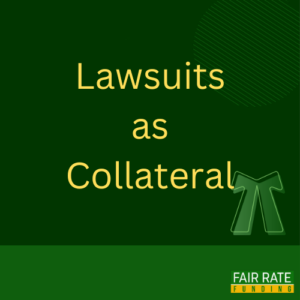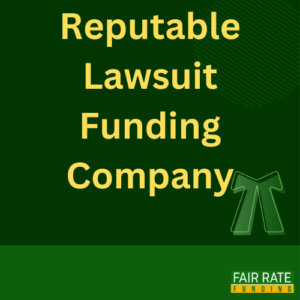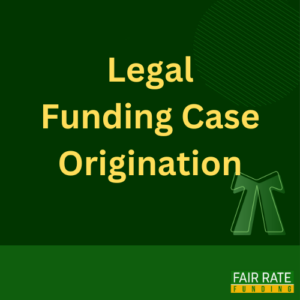Uncovering How Pre-Settlement Funding Works
Pre-settlement funding works for plaintiffs by providing immediate financial relief to litigants. In this post, we examine how pre-settlement funding works, why it’s important, and how to secure lawsuit funding on your particular lawsuit.
Settlement Funding Basics
Settlement funding contracts are specialty financial transactions where plaintiffs pledge a portion of their future lawsuit proceeds in return for immediate cash. When legal system delays cause financial strain, plaintiffs turn to lawsuit funding to bridge the gap between filing a lawsuit and ultimate resolution of the claim.
Settlement Funding Structure
The way pre-settlement funding works is two parties (plaintiff and funding company) enter into an agreement where part of the lawsuit settlement is transferred to the funding company. In return, a plaintiff receives a lump sum or periodic lawsuit loan payments to use at his/her discretion.

Although these deals are referred to as “lawsuit loans” or “settlement loans”, they are not technically “loans” in the traditional sense. Loans imply repayment of principal and interest at some point in the future. Lawsuit “loans” are structured as a transfer of property rights. They are the sale of future proceeds. Because of this, settlement funding is only repaid from the recovery of damages. If the lawsuit is not successful, what the lawsuit funding company purchased (future recovery) doesn’t exist so the advance is not repaid. Further, the company cannot pursue a plaintiff personally for repayment.
Pre-Settlement Funding Cost
Settlement funding cost varies from one company to another so it is wise to shop for lawsuit loans diligently. When shopping, be sure to compare lawsuit loan rates but also be aware of how the rate is applied to the advance amount. Companies will generally charge either a simple interest “rate” or compound the rate monthly. The best lawsuit funding companies will offer competitive rates. Reputable lawsuit loan companies will answer all of your questions regarding pricing right over the phone.
The way pre-settlement funding works is that repayment depends upon how long a case takes to successfully resolve. The longer the lawsuit drags on, the more money is due. The good news is that repayment amount are generally listed within the contract. Lawsuit loan best practices dictate that the terms, rates, and repayment amounts be clear on the funding document.
Why Pre-Settlement Funding Works This Way
Pre-settlement funding transactions are designed differently than traditional loans for a reason. Traditional loans are regulated and charges are often capped at a pre-determined amount. Lawsuit loans are not repaid if the case is lost. Thus, most lawsuit loan losses are total losses of investment capital. If costs were capped under state usury laws, funding companies couldn’t realize a profit. Since lawsuit loan are not loans, pricing can be higher than regulated loan pricing. Pre-settlement funding works the way it does so companies can price in their risk of loss outside state usury laws and still stay in business.
Why Pre-Settlement Loans are Important
The power of lawsuit loans is that they give plaintiffs the financial staying power to endure a long, drawn out litigation process. Delays in justice are simply a feature of the system since only limited resources are allocated to resolve disputes between parties. These delays often cause plaintiffs financial strain, especially if plaintiffs are injured and no longer able to work. Financial stress causes many plaintiffs to settle for less than they deserve simply because they need to keep expenses current. Avoiding the need to accept low-ball settlement offers is the very reason pre-settlement works for plaintiffs. By easing immediate financial concerns, lawsuit loans allow attorneys to litigate the matter properly and to its proper conclusion – just compensation for plaintiffs.
If You Have Any Questions, Call 888-964-2224
WE ARE HERE TO HELP YOU!
How to Secure Pre-Settlement Funding
Allowing pre-settlement funding to work for you is pretty easy. The lawsuit loan process begins with an application. After an initial screening, and your case pre-qualified for funding, lawsuit funding professionals will contact your attorney and request relevant documentation. Once received, the documents are reviewed and a discussed with your lawyer. Lawsuit funding underwriting is a niche area of risk management. Lawsuit loan underwriters use the information gathered and make a conservative estimate of the likely settlement value of your case. How much of a lawsuit loan you can get is based upon this determination. Afterwards, the company will make you an offer, which you are free to accept or refuse.
If you decide to accept the offer, you simply execute the funding documents and return them. Your attorney will also sign off on the contract. When all the funding documents are received, you receive your money via overnight courier or electronic bank transfer.
Making Pre-Settlement Funding Work for You
To learn more about lawsuit funding, simply give us a call or contact us online. A live representative will answer/contact you and answer any questions you might have.
Why Choose Fair Rate Funding
You obviously have a choice for legal funding. We’ve been in the legal funding business since 2007 and offer:
- Simple and Easy Process – Approval only on strength of your case.
- Risk – Free Proposition – Only repay if you win your case.
- Rapid Approval and Funding – Approvals often within 24 hrs.
- Up Front Pricing – Absolutely no hidden fees.
Give us a call and learn about your options. We are here to help and are at your service.
Thank you for your interest in pre-settlement funding.









